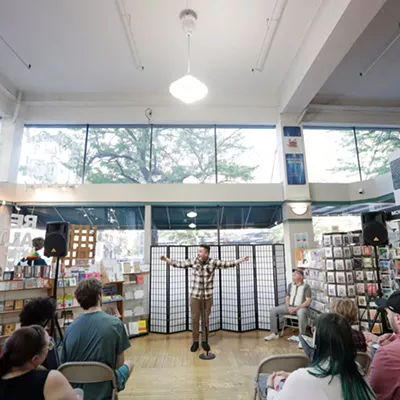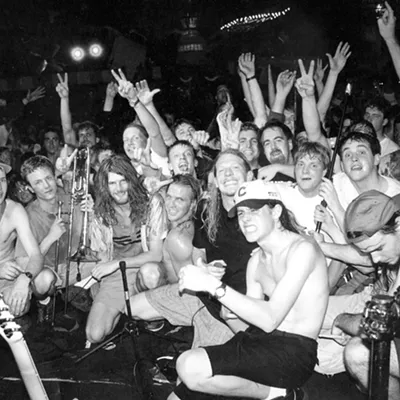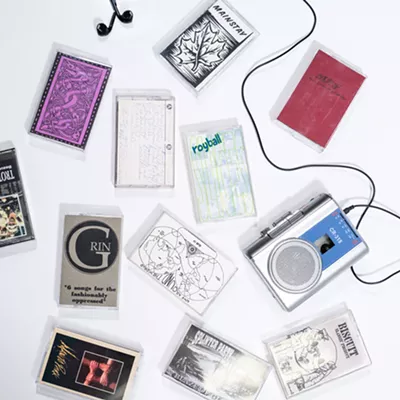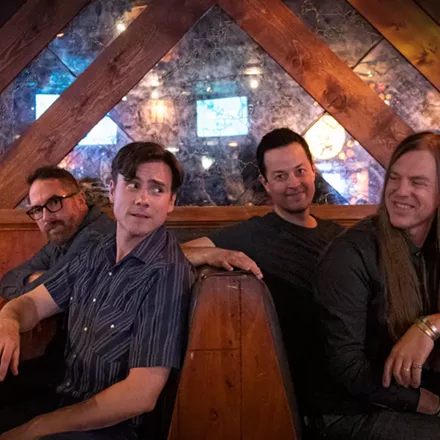He says yes to everything. A voiceover gig. An acting gig. A show in Grants Pass, a show in Spokane. Henry Rollins, the legendary muscle-y, big-necked singer of Black Flag and Rollins Band, says that he has to say yes. To everything.
I doubt it’s because Rollins (who is also a radio DJ, author, book publisher, actor, activist and humanitarian) is hurting for cash. But we don’t talk about that. Rollins, now 49, talks of his fear of the bottom falling out — that this 30-year ride of being a rock star and punk-rock icon will dissolve. That if he stops working, he’ll have to go back to being a working-class slave.
“I’m just kind of a creature of opportunity. I come from the minimum-wage working world. I’m not really trained to do much besides lift things and maybe serve food,” he says. “I just say yes to the work. I know what I have to go back to, which is a minimum-wage job.”
Rollins insists he’s not an artist. A hack. That he only got a chance because the punk rock world of the 1980s gave an opportunity to a kid like him.
“[Punk allowed] the mediocre to have a shot. You just had to show up and mean it,” he says.
And because he meant it then, he has an audience now. People want to listen to what Henry Rollins has to say. And, thankfully for his bank account and that persistent fear of having to go back to work at Haagen-Dazs, Rollins likes to talk.
A professional one-way chatter, Rollins has launched four spoken-word tours —part-scripted, part on-the-fly stage shows about politics and human rights, music and his travels around the world.
He travels “pretty far and wide for just some guy,” having ridden the Trans-Siberian railroad and plunged himself into politically wrecked countries like Burma and Pakistan. He uses those experiences to craft educated, pointed commentary — and it isn’t just ex-punks who are listening: Rollins’ willingness to speak out about human rights issues earned him a 46664 Bangle, a bracelet awarded to social activists by the Nelson Mandela Foundation.
Rollins says this tour — dubbed the “Frequent Flyer” tour — is largely concerned with the idea that no country is perfect. That many developed countries — Canada, Australia, the United States — all have work to do.
“I just lay out all these major countries that need work, and that it’s not moving fast enough,” he says, pointing out that Canadians’ admiration for Ann Coulter and America’s toleration of Constance McMillen’s barring from her high school prom (because she is a homosexual) means we still have work to do.
“They cancelled the prom rather than having a dyke in their prom — this lesbian that is besmirching this heterosexual event,” he says, scoffing. “These are teachers that are doing this. This country needs work too. So let’s go.”
Rollins says that he can’t imagine writing lyrics about all of his spoken-word material. Today it’s more natural to him to simply talk plainly about it all than craft it into songs.
“The talking shows allow me to editorialize and make comments,” he says. “With the music, I just feel it’s kind of behind me. Nothing is compelling me to write lyrics.”
His spoken word is also his way of ensuring that he’s creatively challenged. Performing Damaged or “Liar” would just be rehashing the past.
“What I don’t want to do is be my age and play old music. I think it’s artistically lazy and artistically cowardly. I can’t put down people like Ozzy for going out and playing ‘Paranoid’ every night… that’s them,” he says. “But for me — because I could legitimately be that guy doing music I wrote in my 20s — when I see other people do it, I say, ‘Is that all you can do?’ “Yeah, I don’t miss [music].
I think I rang that bell real hard and real often for a long time, and I don’t think you can say I didn’t ring it.”
Henry Rollins performs at the Bing Crosby Theater on Tuesday, June 22, at 8 pm. Tickets: $20. All-ages. Visit ticketswest.com or call (800) 325-SEAT.
























